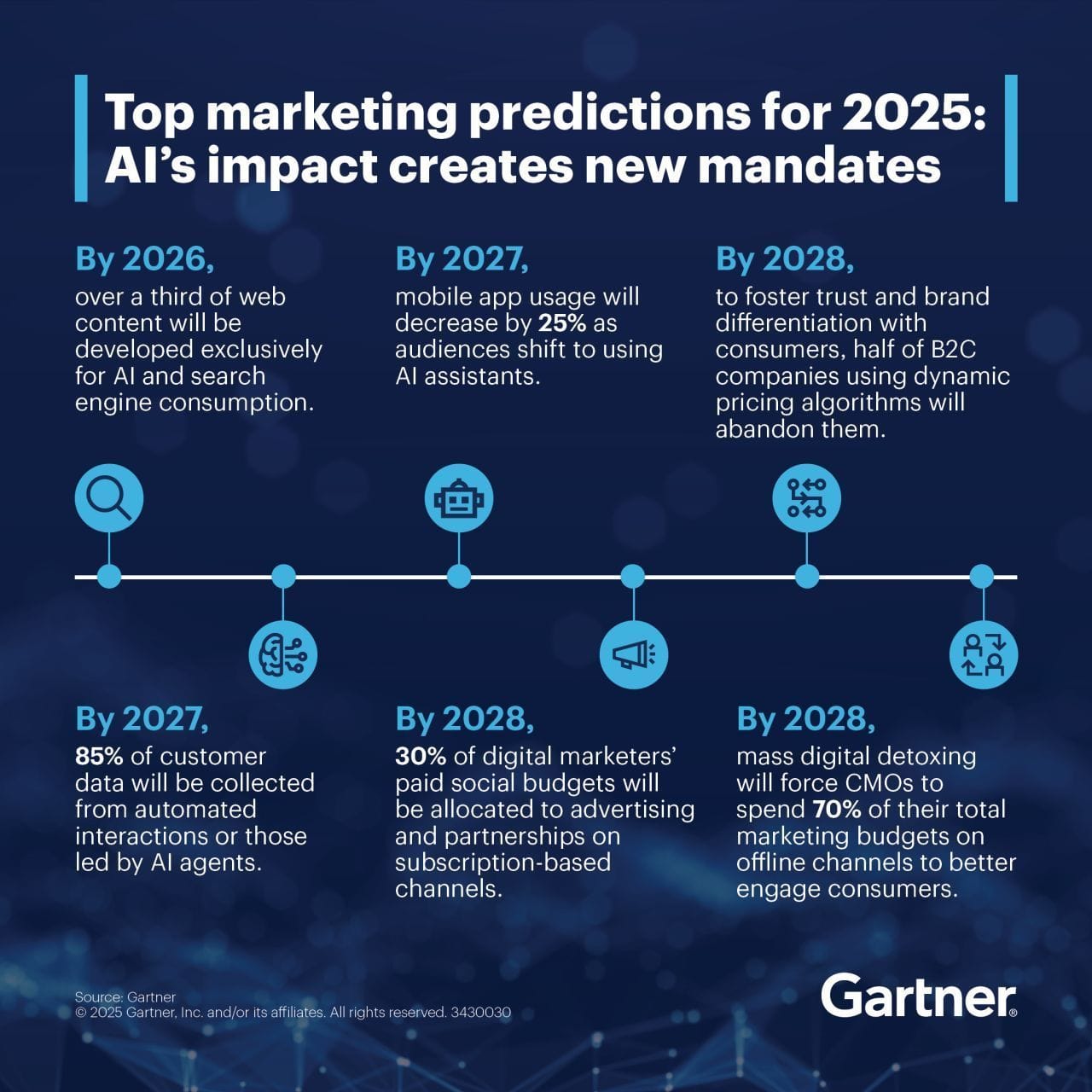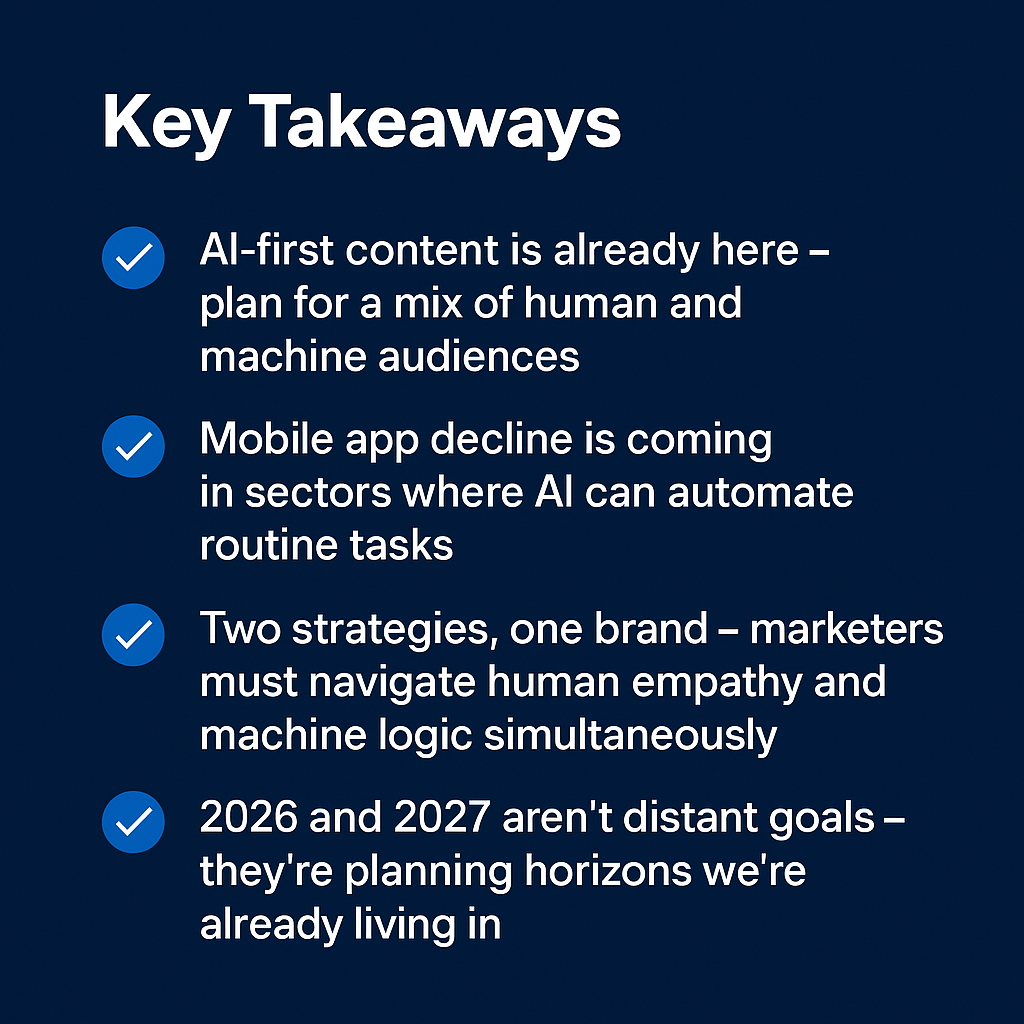AI assistants, content built for bots, and digital detoxing – what Gartner says is coming for marketers, and why they might arrive sooner than you think.
Gartner recently published a set of bold predictions for marketing through to 2028, each centred around a rapidly changing digital landscape driven by artificial intelligence.
It’s a provocative idea that reflects a growing reality – as AI agents start to take a more active role in how we search, consume, and interact with content, brands must rethink not just how they engage, but who they are engaging.
These forecasts raise two essential questions: are these scenarios realistic, and is the timeline too fast – or not fast enough?

Of the six predictions Gartner makes, two stand out to me for both their immediacy and plausibility:
- By 2026, over a third of web content will be developed exclusively for AI and search engine consumption.
- By 2027, mobile app usage will decrease by 25% as audiences shift to using AI assistants.
Let's take a closer look.
By 2026: One-Third of Web Content Will Be Written for AI and Search Bots
At first glance, this might seem bold. But when you consider how much content is already created to please Google’s algorithm — and now, increasingly, generative AI models — the figure might be conservative.
We’re already seeing:
- SEO-optimised content geared more toward crawlability than readability.
- AI-generated summaries that reduce the need for users to click through.
- Search results filled with AI-crafted answers instead of traditional links.
In other words, the shift is happening.
This doesn’t mean we’ll all be writing only for machines. However, it does mean that content creators and marketers will need to ensure their work is structured and tagged in a way that AI models can easily interpret.
The rise of structured data, clear metadata, and factual reliability will matter just as much as engaging storytelling.
By 2027: Mobile App Usage Will Drop by 25% as AI Assistants Take Over
This prediction suggests a major behavioural shift: users moving away from opening apps to simply asking an AI assistant to get things done.
It’s not far-fetched. With AI models like ChatGPT, Claude, Gemini, and their integrations across devices, we’re already seeing users delegate routine tasks to assistants.
But this forecast needs nuance.
Apps won’t vanish overnight. Many provide rich, tailored experiences that AI can't yet replicate — think banking, media streaming, or productivity tools. What’s more likely is:
- Apps running quietly in the background, behind the scenes.
- AI assistants acting as the interface between users and services.
- Fewer taps, more voice or text prompts.
For marketers, this means designing not just app journeys, but AI-accessible endpoints — APIs, structured data, and content ready to be actioned by a virtual agent.
🧠 Serving Two Audiences: The Human and the Machine
Gartner’s most provocative framing is that we now have two customers:
- The human: seeking trust, connection, and simplicity.
- The machine: parsing structure, logic, and reliability.
Both are critical. Human audiences are increasingly sceptical, fatigued by content overload and frustrated by manipulative pricing models. Machines, on the other hand, are now the first line of engagement — filtering, summarising, and even recommending on our behalf.
This creates a real tension. You can’t ignore one to serve the other. And that’s what makes Gartner’s report so timely: Marketers can no longer rely on a single approach.
Instead, they must:
- Create engaging, emotional, trust-building experiences for real people, and
- Develop structured, machine-readable content and systems that AI tools can interpret and act on.

Is Gartner’s timeline too fast? I don't think it is. If anything, the speed of AI development over the past two years suggests these milestones may be conservative, even the two I've written about here.
Are the predictions credible? Yes – and perhaps even inevitable, especially for marketers in tech-forward industries.
The future of marketing won’t be a binary switch between human and machine. It will be a layered, adaptive process, one that rewards clarity, consistency, and the ability to show up wherever and however your audience (or their AI delegate) is looking.
How do you see the immediate future for marketing? According to Gartner, or something else? Do share your thoughts in the comments.
☑️ Related Reading:
- Gartner Marketing Predictions: 6 actionable insights for what’s next in marketing strategy and AI integration in 2025 and beyond – download PDF.
- For Immediate Release podcast 438: Google’s AI Overviews are upending SEO (4 December 2024).















